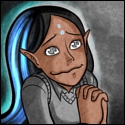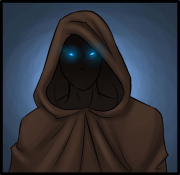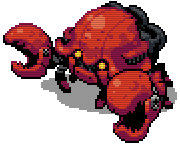|
Well, there's the tagline for my next Feng Shui campaign, right there.
|
|
|
|

|
| # ? Apr 19, 2024 22:32 |
|
It's also hilariously-parochial in its ignorance of fantasy source material. Dude's never heard of the Mahabharata and its Astras?
|
|
|
|
On that note, what was the inspiration for the spellcaster supremacy besides nerd wish fulfillment? Gandalf casts very little actual magic in LOTR, Elric's main weapon is a super sword, Conan slaughters wizards and sorcerors, etc.
|
|
|
|
Imagine a locker door slamming shut over a human face...forever. Edit: although to be fair, things like Conan doing the locker-slamming are just as dumb coming from the opposite direction - a time not nearly as past as we'd like it to be, when anti-intellectualism was widely held up as moral virtue. I mean it still is, to an extent, but now we can mock stupid people for saying stupid things in real time. With the internet. On Something Awful Dot Com. We're living in the future, y'all. Thesaurasaurus fucked around with this message at 17:04 on Apr 25, 2015 |
|
|
|
Thesaurasaurus posted:Imagine a locker door slamming shut over a human face...forever. That's pretty much my theory, an early association of non-magical classes who excel based on physicality with Jocks. Also a knee jerk "magic is better and cooler than anything that's real" escapist fantasy.
|
|
|
|
Kavak posted:On that note, what was the inspiration for the spellcaster supremacy besides nerd wish fulfillment? Gandalf casts very little actual magic in LOTR, Elric's main weapon is a super sword, Conan slaughters wizards and sorcerors, etc. It's mostly that "mundane" heroics were much more freeform and hand-wavey, while wizard poo poo was laden with a bunch of restrictions that were unfun or off screen enough that no one liked using them. As the game evolved, "mundane" stuff had the life crushed out of it in pursuit of verisimilitude/realism, while the restrictions on wizardry were chipped away in the name of fun. I mean, it's not entirely that simple, but I think that's a good summary of the trends. Edit: Of course, another factor is them being bad writers. The thief was just so loving awful from the get-go. But they had fun in the game Gary put them in! It paints a picture of Gygax-as-Simbieda, writing rules and pulling numbers out of his rear end with no real intention of using them at his table except as vague idea-touchstones. That Old Tree fucked around with this message at 17:16 on Apr 25, 2015 |
|
|
|
Plague of Hats posted:Edit: Of course, another factor is them being bad writers. The thief was just so loving awful from the get-go. But they had fun in the game Gary put them in! It paints a picture of Gygax-as-Simbieda, writing rules and pulling numbers out of his rear end with no real intention of using them at his table except as vague idea-touchstones. Yeah, it's actually kind of weird to realize that we accept the idea of sneaky type martial characters having a backstab mechanic for bonus damage as a given at this point. Especially when it's so often just a slight increase to damage, rather than what fiction generally presents to us (sneaky guy outright drops multiple opponents in a single hit each). But that's also heavily down to the at odds intersection of most fiction being protagonist based rather than party and potential fights in fiction generally being obstacles rather than fun exercise.
|
|
|
Kavak posted:On that note, what was the inspiration for the spellcaster supremacy besides nerd wish fulfillment? Gandalf casts very little actual magic in LOTR, Elric's main weapon is a super sword, Conan slaughters wizards and sorcerors, etc.
|
|
|
|
|
LornMarkus posted:Plus there's the interesting tidbit about FR that not only are the gods real and have come down to visit/gently caress poo poo up many times, but not believing in any god is actually a form of damnation. If you die with no patron deity to collect your soul then it gets tossed into the Wailing Wall to suffer eternally. I believe the only respite at that point is one of the devils or demons might come by recruiting. Forgotten Realms is in dire need of Atheism Domain God. LornMarkus posted:Well that's the other funny thing: I don't remember which cosmic shake-up to in universe explain an edition shift it was, but one of them actually involved Ao the Overgod kicking all the other gods into the mortal realm because he was tired of them being lazy sacks. And part of the solution was that direct tie of their wellbeing to prayer and worship. Before that I believe it just felt good and maybe gave them a little power boost. Doesn't the Rules Cyclopedia (and whatever edition it was based of again) have actual rules for that in the Immortal endgame? Stuff like "If you run out of followers, you have one year to fix this or you'll vanish", and "X followers give you Y experience points per year, which you can use to do Z". LornMarkus posted:Yeah, it's actually kind of weird to realize that we accept the idea of sneaky type martial characters having a backstab mechanic for bonus damage as a given at this point. Especially when it's so often just a slight increase to damage, rather than what fiction generally presents to us (sneaky guy outright drops multiple opponents in a single hit each). But that's also heavily down to the at odds intersection of most fiction being protagonist based rather than party and potential fights in fiction generally being obstacles rather than fun exercise. It's all thanks to the abstractness of hit points, which allows powerful heroes to sleep inside a burning building or walk around with so many arrows and bolts stuck in their bodies that they look like a pin cushion. Doresh fucked around with this message at 18:17 on Apr 25, 2015 |
|
|
|
Kavak posted:On that note, what was the inspiration for the spellcaster supremacy besides nerd wish fulfillment? Gandalf casts very little actual magic in LOTR, Elric's main weapon is a super sword, Conan slaughters wizards and sorcerors, etc. Robert Vance and the Dying Earth stuff? After that I think it's all homegrown. Wizards really were pretty drat hard to play by the rules early on. As each level of restriction is stripped off, it tends to be done in the form of "houserule for 10 years, new edition adopts houserule" so that people forget how wizards used to be. I mean, remember that second edition didn't give you poo poo for spells. You got them off scrolls, you started with a few random spells your DM assigned you, and the only way to automatically learn them was you got one per spell level attained if you were a specialist. This sucked and so a lot of people houseruled in "you learn some spells per level so that the DM doesn't have to be reminded about scrolls all the time" and then when 3e hits, all of a sudden it's just "two new spells of your choice per level, make sure to pick the ones the internet says are really good because the DM can't say poo poo." This is the case for every wizard weakness. HP super low? Start with max die for first level, there you go chubbly. Concentration checks? Too scary, let's just remove those. Monsters keep making saving throws? Don't worry, we'll add a bunch of spells that don't even use those. Spending XP and Con and stuff on magic items and big spells? Goodness no. In fact, let's just ignore material components, how about that buddy, is that okay? You also wanna go to McDonalds? Okay, we'll go to McDonalds. Basically all that poo poo happens slow and new generation of players take it as gospel that wizards were always supposed to be as good as they were at ... well whatever wizards looked like when that player was 13.
|
|
|
|
So D&D caster supremacy wasn't an in-rule thing until 3.0?
|
|
|
|
theironjef posted:This is the case for every wizard weakness. HP super low? Start with max die for first level, there you go chubbly. Concentration checks? Too scary, let's just remove those. Monsters keep making saving throws? Don't worry, we'll add a bunch of spells that don't even use those. Spending XP and Con and stuff on magic items and big spells? Goodness no. In fact, let's just ignore material components, how about that buddy, is that okay? You also wanna go to McDonalds? Okay, we'll go to McDonalds.
|
|
|
|
Kavak posted:So D&D caster supremacy wasn't an in-rule thing until 3.0? Second edition wizards were marginally better than first edition (but it was pretty even across the board with class improvements) and then third edition wizards just went to the loving moon. Basically in their attempt to strip off the old-fashioned cruft of the old edition, they took the cool stuff from some classes as cruft (animal companions, an army and a base) and the restrictions from other classes as cruft (wizards and clerics). The results are pretty clear.
|
|
|
|
Kavak posted:So D&D caster supremacy wasn't an in-rule thing until 3.0? The had terrible hit dice (D4), couldn't wear armor, were useless in a fight, crummy saves, could only cast one or two spells a day at low levels, the spells were randomly determined (seriously, your beginning spellbook in AD&D 1E had the DM roll four times on the level 1 spell table - those were the spells you started the game with), you didn't get new spells automatically, you had to carry a big fragile spellbook around and sleep 8 hours every night to recharge (remember, this was an era where random encounters were assumed to be in use), you had to track and gather all kinds of weird material components, there were very few magic items or spells or metamagic feats that allowed you to get around these restriction. You were poo poo until you got up to level 5-6 and you could start casting useful combat spells like Fireball and Lightning Bolt and Cone of Cold and Cloudkill (that is, if your GM or the dice let you have them). Notice also that the limited spell availability made it hard for wizards to load up on niche-destroying slates of spell (knock / passwall / disarm trap / what exactly are we paying the thief for exactly? / etc.)
|
|
|
|
theironjef posted:Second edition wizards were marginally better than first edition (but it was pretty even across the board with class improvements) and then third edition wizards just went to the loving moon. Basically in their attempt to strip off the old-fashioned cruft of the old edition, they took the cool stuff from some classes as cruft (animal companions, an army and a base) and the restrictions from other classes as cruft (wizards and clerics). The results are pretty clear. I read a lot of it was that the playtesters played their wizards like 2e Wizards, using them as blaster artillery instead of trying out Save or Suck spells, and they never really caught on to how powerful those were until people who hadn't played 2e got their hands on them and realized you could effectively one-shot people with them with good odds.
|
|
|
|
FMguru posted:No, 1e/2e casters were weak as gently caress until they got up to high levels, at which point most people were OK with them being overpowered because it seemed only fair after being underpowered for most of their run. Wizards even needed more XP to level up back then, which was stripped quietly away because it was stupid, but stupid or not, it was a balancing mechanic they failed to replace with a less stupid balancing mechanic.
|
|
|
|
Night10194 posted:I read a lot of it was that the playtesters played their wizards like 2e Wizards, using them as blaster artillery instead of trying out Save or Suck spells, and they never really caught on to how powerful those were until people who hadn't played 2e got their hands on them and realized you could effectively one-shot people with them with good odds.
|
|
|
|
One day I'm going to make a fighter focused on grappling who gives out atomic wedgies and power noogies. His dream is to one day deliver a cosmic swirlie to Boccob.Cythereal posted:Normal looking is mainly so people don't freak out the moment they see any of your wonders, especially the big ones. Pill form is meant for potions/scrolls/bombs and similar one-shot uses. I get that it's supposed to be for potions (without being potions because we're science not magic), but it just seems so strange to me to make that specifically be the thing that also means mortals can just pop a pill and it works, because it just seems to go against everything they're trying to do with 'mortals and wonders don't play nice' to have a way to entirely circumvent that as long as no one tries to do lines of ground-up science pills. darthbob88 posted:There is that, and after thinking some more, you can create a starting character whose wonders have a better than 90% chance of curing any disease or healing any wound, no matter how terminal, or rendering a subject (nigh)invisible. And we now have a mechanical reason to tell them to just take two and call me when the bleeding stops to better game the chances against that 10% fail chance.
|
|
|
|
Is it just me or is that faults table in Genius really loving stupid? Like, "renders your device useless" stupid.
|
|
|
Night10194 posted:I read a lot of it was that the playtesters played their wizards like 2e Wizards, using them as blaster artillery instead of trying out Save or Suck spells, and they never really caught on to how powerful those were until people who hadn't played 2e got their hands on them and realized you could effectively one-shot people with them with good odds. Meanwhile for divine casters, buffing yourself and loving things up was a better option than buffing the Fighter, plus druids could turn into a loving bear or something and still cast spells thanks to one simple feat. RandallODim posted:One day I'm going to make a fighter focused on grappling who gives out atomic wedgies and power noogies. His dream is to one day deliver a cosmic swirlie to Boccob.
|
|
|
|
|
I missed magic chat. :C Anyhow, I think RuneQuest's magic systems are more interesting than what D&D has done. You got five of them that are: Work knives getting dull? Got a mild fever and some aches but you gotta get up early and travel in the morning? Have to reach into the cooking fire because Merv knocked the GOD DAMNED POTATO INTO IT THAT'S THE FIFTH TIME THIS WEEK MERV GOD. Hooray for Folk Magic, the little things that the lay people would pick up or devise in a world where magic is readily available. Tricks such as making your bladed implements sharp, making minor ailments go away, staving off fatigue from hot weather or reaching into hot (but not too hot) places to extract things. Not really game changing, but a clever person could ruin someone's day with them. Then you have ascetism or whatever it's called where you get X number of passive spells and Y number of focus based ones you can have active at a time. Not as flashy as real magic, but you can have super human senses, spider climb walls and do other absurd feats. And all because you spent most of your life in an 80's training montage. Shamanism is all about binding spirits and getting them to do things for you. You can't dunk on people with fireballs or portals through walls, but you can call down packs of wolf spirits to rend your enemies or hijack their souls from their bodies and possess them. Sorcery is neat in that you have a baseline of stats for spells. All spells start with the same damage/range/targets/etc. Based on how awesome of a sorcerer you are, you get X number of points to pump up the attributes of your spell for each point spent. And you don't learn specific spells, but spell effects that you can combine. So you can make a fireball that travels through shadows and then shrinks the targets that survive if you have enough sorcerous might. Last is Miracles, which are hideously powerful. But you only get so many points with which to pay for them before you have to stop at a sanctified and official temple of your patron deity before that pool refills. And even then, you may have to make a sacrifice to your god or go on a quest if you hosed up and broke a tenet. RuneQuest also gets points because all the different magic systems use the same resolution system (which I think is BRP) to resolve the spells. It adds a whole lot to the system even though the basics of RQ are really simple and generic. As for Vancian magic, D&D is as Vancian as Obama is a secret Kenyan muslim out to cripple the US. Having read through half of the Dying Earth novels, most of the wizards in those stories are capable of tiny feats of magic that never really tax them or have an arsenal of items on them that let them achieve a wide variety of effects. The magic that wizards forget tends to be the scale of reality breaking and weapon of mass destruction. So I don't get why spell slots really matter before 5 level or so, or why they didn't just make most of the spells beneath that level relatively weak to copy the feel of the stories.
|
|
|
|
Thesaurasaurus posted:It's also hilariously-parochial in its ignorance of fantasy source material. Dude's never heard of the Mahabharata and its Astras? Most nerds get their myths from brief, sanitized English class units on the Greeks, or Deities and Demigods. Besides, you show people something easily accessible like Sita Sings the Blues and ask them to emulate it in their pet system and nine times in ten their heads will explode.
|
|
|
|
FMguru posted:My favorite example is from the Pathfinder core book, where archers and rangers and mundane healers have to hand-track their expenditures of arrows and rolls of bandages, while spellcasters can just carry around a generic Components Pouch. Well, that's just because arrows and bandages have a price. It all makes sense! Kavak posted:So D&D caster supremacy wasn't an in-rule thing until 3.0? Well, a 1st level wizard could use Sleep as a "Let's auto-win the encounter" button if said encounter isn't too hard, but that's about all he's good for for that day. And don't even think about the 15 minute adventure day because dungeons are full of wandering monsters and PCs were so fragile that you really don't want to spend too much time there.
|
|
|
|
There are actually three different sets of stories in Dying Earth, with different magic systems. The original stories gave us classic "Vancian" magic, where people could memorize up to 4-6 spells which they would forget when they cast them, and they'd all have very precise and repeatable effects (it was implied that this magic was essentially a remnants of a long-lost branch of mathematics). Because you could only carry a handful of one-shot spells in your head at once, the magician-protagonist characters in those stories were loaded up with magic items and armor and were also very handy with swords, completely unlike D&D's "98-pound weakling in his bathrobe" conception of a wizard. Vance's final series of DE stories involved a conclave of archmages who spent all their time scheming against each other (and inviting themselves to dinner) when they weren't flying their magic palaces to other galaxies or suchlike. They did very little actual magic - instead they bound these powerful djinni-like creatures (called Sandestins) to their service and forced them to do incredibly powerful things for them (like stop time, or fly my magic palace to a distant galaxy, or similar). The Sandestins would get back at their captors by scrupulously obeying their instructions to the letter while trying to subvert their spirit. The official Dying Earth RPG covers all of this, and is highly recommended (as are the stories themselves).
|
|
|
|
Young Freud posted:I know it's pretty early in this book, but are there any men in this book? I'm seeing a lot of petite-looking girls. There are illustrations of men. However, due to the author having limited rights on how he can use some artwork, I'm unable to showcase all of PoS' pictures. I was going to bring this up next post, but I wanted to say that I contacted Christopher Moore (Path of Shadow's writer) before the review. Basically, the artwork falls under Product Identity and wanted to get permission to use it in my review from Chris. Some of the artists have stronger restrictions on how their art can be used/disseminated; a lot of the ones I'm showing and plan to show are by Danielle Sands, who allowed Chris to reuse the artwork how he sees fit. One thing I do like about this book is that at the very end the author gives an individual list of all the art pieces and who was responsible for drawing them. I like this as it showcases the talent for interested readers. A lot of RPG books just give a generic list of credits instead. Libertad! fucked around with this message at 20:06 on Apr 25, 2015 |
|
|
FMguru posted:There are actually three different sets of stories in Dying Earth, with different magic systems. The original stories gave us classic "Vancian" magic, where people could memorize up to 4-6 spells which they would forget when they cast them, and they'd all have very precise and repeatable effects (it was implied that this magic was essentially a remnants of a long-lost branch of mathematics). Because you could only carry a handful of one-shot spells in your head at once, the magician-protagonist characters in those stories were loaded up with magic items and armor and were also very handy with swords, completely unlike D&D's "98-pound weakling in his bathrobe" conception of a wizard. Wasn't it not really practical to bring spell tomes with you, too? Like an individual spell was contained in a large book, by itself, or something, so you loaded up with spells at your library, then you went out to do whatever you were planning on, and if you wanted more spells you had to drop everything and go all the way back home? quote:Vance's final series of DE stories involved a conclave of archmages who spent all their time scheming against each other (and inviting themselves to dinner) when they weren't flying their magic palaces to other galaxies or suchlike. They did very little actual magic - instead they bound these powerful djinni-like creatures (called Sandestins) to their service and forced them to do incredibly powerful things for them (like stop time, or fly my magic palace to a distant galaxy, or similar). The Sandestins would get back at their captors by scrupulously obeying their instructions to the letter while trying to subvert their spirit. 
|
|
|
|
|
Rand Brittain posted:When last I inquired about it, it seems like the Wall of the Faithless was originally supposed to be unique to Myrkul, the evil god of death, and its continued presence after his demise is the result of a whole bunch of author misunderstandings. Night10194 posted:At the same time, it's like the only thing giving them any actual flavor and makes a great meta commentary on the hollowness of FR's religious fiction. I thought it was neat in showing how the overgod Ao really didn't give a poo poo about anything in reality other than gods, and he liked Myrkul's idea so much he kept it in as a way to force people into following religions and thus empowering the gods. Whether or not the gods were okay with it (Kelemvor, for example) is another matter entirely. At least, that's my interpretation, but it does color the setting quite a bit when the creator of all reality's a terrible, horrible dickwad. Then again, I think that Dragonlance's handling of the "good" gods and Istar and the Cataclysm comes off as worse, so maybe it's just my perspective talking.
|
|
|
|
I kind of like how World Tree handles magic, where literally everyone in the setting can cast spells, and magic is basically just the technology of the setting. In that game, a wizard isn't necessarily someone with unique reality-bending powers; everyone has those powers to some degree. A wizard is just someone that is magical professionally, someone that invents new spells. It's also a setting where life points aren't an abstraction. They're a known measurement. People do exercises to increase their life points. The statistically minded can, and have, run experiments where you subject someone to repeated castings of a spell that does exactly 1 point of damage, and count how many castings until they die, in order to measure their life total.
|
|
|
|
Zereth posted:Wasn't it not really practical to bring spell tomes with you, too? Like an individual spell was contained in a large book, by itself, or something, so you loaded up with spells at your library, then you went out to do whatever you were planning on, and if you wanted more spells you had to drop everything and go all the way back home? The DERPG makes it essentially impossible to refill your resource pools (skills, abilities, spells) until you spend a day or two off in a completely secure area relaxing (no standing watch, no guard duty, no noises in the darkness). Also, spell tomes were really rare (fewer than a hundred spells were known to exist) and transcribing them was really hard. You also wanted to keep your spells to yourself and out of the hands of rivals. The last thing you'd do is tuck it under your arm and go out on an adventure.
|
|
|
|
And those last 100 spells were amazingly powerful. The Most Excellent Prismatic Spray literally shreds everything around you with thousands of prismatic streamers and The Gyrator can let you throw someone high into the sky where the pelgranes can finish them or spin them so fast that the centrifugal forces rend them apart. Removing the need to breathe, sleep or eat, bearing people underground for centuries where no one can get them or summon demons to carry off someone to a distant place are all things those spells can do. But then there are also witches and warlocks who can work magic because they deal with demons.
|
|
|
|
My understanding is that while Dying Earth wizards might only have three spells, they're some really, really amazing spells.
|
|
|
|
Libertad! posted:I thought it was neat in showing how the overgod Ao really didn't give a poo poo about anything in reality other than gods, and he liked Myrkul's idea so much he kept it in as a way to force people into following religions and thus empowering the gods. Whether or not the gods were okay with it (Kelemvor, for example) is another matter entirely. Pretty much any fantasy setting with both objective morality and real, provable divinity is gonna run hard into the Problem of Evil. This is one reason I enjoy Exalted despite all the myriad reasons to not enjoy Exalted: even when gods and elementals and such aren't being outright dicks, they don't necessarily have any sort of better answer to difficult moral quandaries than anyone else. Some of them try! But the road to hell, etc...
|
|
|
|
It seems a big part of why caster supremacy happened is because there's too much source material and D&D tried to incorporate all of it at the same time. You can start with something simple and subtle and not game-breaking, like what Gandalf does or whatever, but then someone mentions they read this awesome fantasy book over the weekend where a wizard summoned lightning from the sky, so that goes in the game because yeah that's wizard stuff all right. Then some other source book had a wizard who could levitate, and scrying is in all kinds of stories, sure, and teleportation, lots of examples of that in fiction too. And the people doing this were all wizards, in some form or another, so when you've got all this source material you want to make work in your game sooner or later you hit that critical mass of versatility where wizards can instantly scry-bomb any villain within 200 miles who looks at the PCs funny. Warriors, meanwhile, don't display nearly the same breadth of ability in fiction. There are only so many ways you can hit someone with a sword, and even the flashier and fancier ones rarely tend to extend to the likes of flight, teleportation, summoning bear swarms, and the like. No matter how many pulp fantasy books you read, you're probably not going to end up with this problem. In most fiction though, wizards were often villains. Their powers were depicted as terrifying, world-threatening stuff, and only the demands of plot and author restraint kept them from just nuking the heroes into oblivion on page 10. If a wizard in a work of fiction is not a villain, he's a temperate mentor who barely uses magic except in a real pinch, or a student or someone else of deliberately limited capacity. But when you give player characters access to the same (or greater; see above) breadth of magical tools, without any of the restraint, you get caster supremacy.
|
|
|
|
Thesaurasaurus posted:Pretty much any fantasy setting with both objective morality and real, provable divinity is gonna run hard into the Problem of Evil. This is one reason I enjoy Exalted despite all the myriad reasons to not enjoy Exalted: even when gods and elementals and such aren't being outright dicks, they don't necessarily have any sort of better answer to difficult moral quandaries than anyone else. Some of them try! But the road to hell, etc... Eh, the Problem of Evil only applies if the God is Omnipotent, which no D&D entity has ever been. The Good Gods being as poo poo as the others is an unintentional flaw of the writing, but their powers are objectively limited and they can get punched in the dick by powerful mortals or demons or whatever, so the idea that Evil exists that the Gods do nothing about isn't as major of a theological quandary as it is in a monotheist religion with an omnipotent divinity.
|
|
|
|
And yet, amazingly, one of the best and coolest wizards can't be done in D&D; to wit, Ged of Earthsea.
|
|
|
|
I think AD&D and 3E both kind of modelled Gandalf with wizards. In AD&D, you had great power but it was limited and you had to use it carefully, and you were often better off supporting non-magicians in various ways and working closely with them in order to further your ends. In 3E, you were an angelic being whose powers mortals could barely conceive, and were able to rouse and replace major political figures - often in the span of several weeks!
|
|
|
|
|
Kavak posted:So D&D caster supremacy wasn't an in-rule thing until 3.0? It depends what you mean. In oD&D and 1E the casters were on a different power curve to the fighter. So the fighter deliberately started stronger and ended weaker. The risk was lower but the rewards weren't as high. And the game was soft-capped at level 10. When a wizard was more powerful than a fighter but nothing like a level 15 3.X wizard. 2E (well, post Dragonlance) was weird. D&D rules used to play a different game entirely. In oD&D a delve was one day. No resting in the dungeon or wilderness (wandering monsters). Which meant that although mechanically the wizard spells and the fighter hit points recovered at a different rate, in almost all cases this was a fluff difference. You'd go into the dungeon fully prepared, leave by the end of the day, and rest at base until everyone was healed before trying again. The 8 hours prepares the wizard, 2 weeks heals the fighter wasn't a critical factor. It was "The fighter spends two weeks of light activity and carousing. The dungeon isn't going anywhere. And the wizard hits the books. If you really need speed, fetch a cleric. Dragonlance and 2e changed this in the direction of fighter supremacy by having Epic Quest Adventures where the wizard got their spells back every morning and the fighter almost never got HP back. On the other hand in oD&D you weren't a party of half a dozen. If you had half a dozen PCs you should have at least a dozen hirelings. The wizard might only have 1d4 hit points, but with half a dozen wardogs, and half a dozen people wearing armour between them and the enemy (as well as the other PCs) there was enough meat and muscle that they shouldn't take a hit unless they messed up. Dragonlance had a small party with no hirelings. Which meant the wizard had nothing keeping them from going down but the generosity of the DM and a very thin wall of meat. So either the wizards died easily or the DM didn't attack them. How powerful wizards were here depended on the DM. But where 3.0 shattered everything was the saving throws and removal of the level soft-cap. In AD&D saving throws got relatively better as you levelled up (so you didn't throw save or suck spells at high level enemies because they wouldn't work). In 3.X they get relatively worse. The highest level PC in Greyhawk was about level 13. 7th level spells were things intended for big evil NPCs. Not for PCs to casually toss around multiple times a day. Also as well as the level cap being removed, so was the endgame. The fighter as a level 10 class feature got an army to balance out the wizard's power. And Vance's mages normally had either plot device spells or bound or bargained with to do the work for them. The D&D wizard is based on wargame battlefield artillery.
|
|
|
|
Mors Rattus posted:And yet, amazingly, one of the best and coolest wizards can't be done in D&D; to wit, Ged of Earthsea. Glen Cook's Black Company books are unusual in that they have several high-power protagonist-wizards, and they bring the magical thunder early and often.
|
|
|
FMguru posted:Glen Cook's Black Company books are unusual in that they have several high-power protagonist-wizards, and they bring the magical thunder early and often.
|
|
|
|
|

|
| # ? Apr 19, 2024 22:32 |
|
Nessus posted:Even there, most of the company's wizards are portrayed as significantly weaker than the people with spooky names, aren't they? The Company just greatly benefits from having them - there were like, two, and that was exceptional.  Yeah, the fact they have even two mid-level wizards gives them a great advantage over almost everyone. Alas for them, their adversaries include Nazgul-equivalents, the woman who can create the Nazgul, and her ex-husband from whom she stole some (not all) of his power.
|
|
|



























